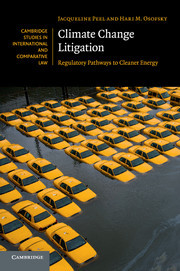Description
Climate Change Litigation
Regulatory Pathways to Cleaner Energy
Cambridge Studies in International and Comparative Law Series
Authors: Peel Jacqueline, Osofsky Hari M.
This book examines how litigation over climate change shapes the choices of governments, corporations and the public regarding mitigation and adaptation.
Language: English
Subject for Climate Change Litigation:
Approximative price 40.64 €
In Print (Delivery period: 14 days).
Add to cart
Climate Change Litigation
Publication date: 11-2017
Support: Print on demand
Publication date: 11-2017
Support: Print on demand
Approximative price 103.04 €
In Print (Delivery period: 14 days).
Add to cart
Climate Change Litigation
Publication date: 04-2015
376 p. · 16x23.7 cm · Hardback
Publication date: 04-2015
376 p. · 16x23.7 cm · Hardback
Description
/li>Contents
/li>Biography
/li>
This examination of the role of litigation in addressing the problem of climate change focuses not only on how the massive and growing number of lawsuits influences regulation directly, but also on how the lawsuits shape corporate behaviour and public opinion. It provides readers with an understanding of how these lawsuits have shaped approaches to mitigation and adaptation, and have been used to try to force and to block regulation. There is a particular emphasis on lawsuits in the United States and Australia, the two jurisdictions which have had the most climate change litigation in the world, and the lessons provide broader insights into the role of courts in addressing climate change.
1. Why climate change litigation matters; 2. Model for understanding litigation's regulatory impact; 3. Litigation as a mitigation tool; 4. Litigation as an adaptation tool; 5. Corporate responses to litigation; 6. Litigation's role in shaping social norms; 7. Barriers to progress; 8. The future of climate change litigation.
Jacqueline Peel is Professor of Law at Melbourne Law School, Australia, and an internationally recognised expert on climate change law. Her teaching and research interests lie in the areas of environmental law (domestic and international), risk regulation and the role of science, and climate change law.
Hari M. Osofsky is a Professor of Law at the University of Minnesota, where she is also the Director of the Energy Transition Lab and the Director of the Joint Degree Program in Law, Science, and Technology. Her research focuses on energy transition and climate change.
Hari M. Osofsky is a Professor of Law at the University of Minnesota, where she is also the Director of the Energy Transition Lab and the Director of the Joint Degree Program in Law, Science, and Technology. Her research focuses on energy transition and climate change.
© 2024 LAVOISIER S.A.S.

